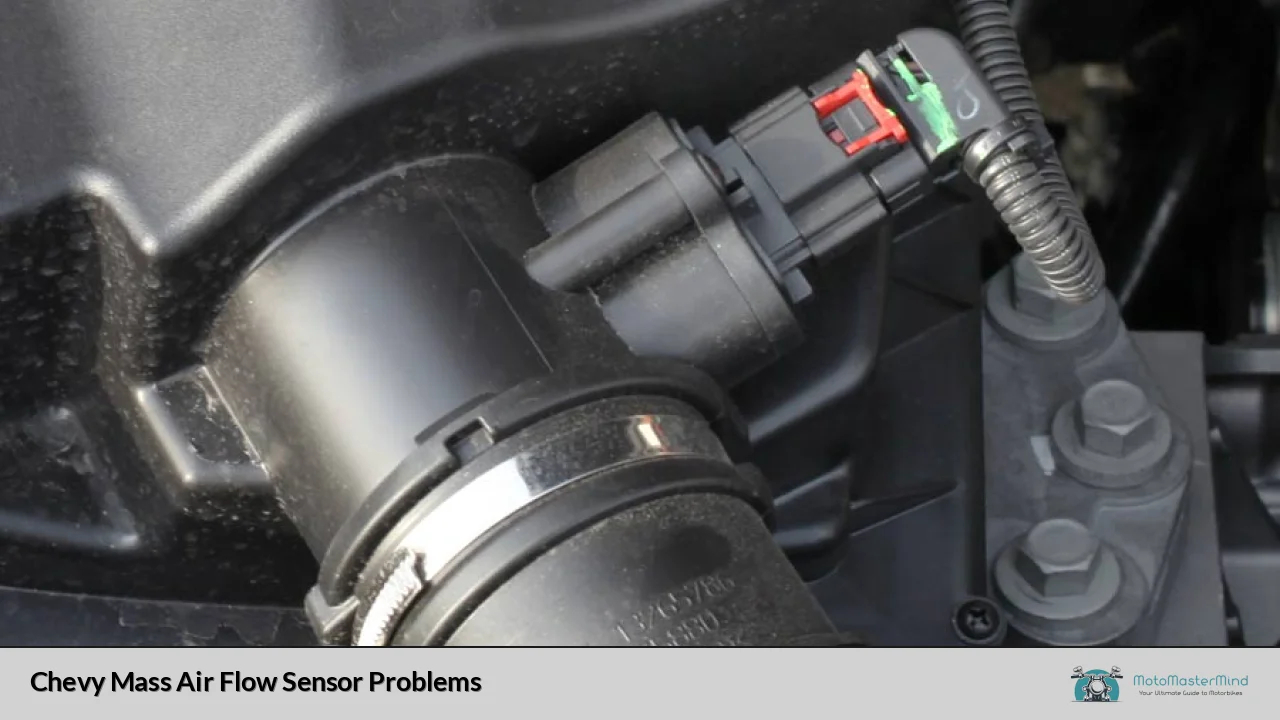Are you tired of dealing with Chevy Mass Air Flow Sensor problems? Well, you’re not alone. Many Chevy owners have experienced issues with this crucial component of their vehicle’s engine. In this article, we’ll delve into the details of these problems and explore some potential solutions.
One common problem that Chevy Mass Air Flow Sensors encounter is contamination. Over time, dirt, dust, and debris can accumulate on the sensor, affecting its performance. When this happens, you may notice symptoms such as rough idling, engine misfires, and a decrease in fuel efficiency. To address this issue, regular cleaning of the sensor is recommended. Using specialized cleaning sprays or following manufacturer guidelines can help restore proper functionality.
Another challenge encountered by Chevy Mass Air Flow Sensors is electrical failure. This occurs when the sensor’s wiring or internal components become damaged or faulty. As a result, your vehicle’s engine may experience hesitation, stalling, or even complete failure to start. In such cases, it’s crucial to have a qualified mechanic diagnose the problem and replace the faulty sensor if necessary.
Additionally, sensor calibration problems can arise in Chevy Mass Air Flow Sensors. These sensors rely on precise measurements to determine the amount of air entering the engine. If the calibration is off, it can lead to inaccurate readings and subsequently affect engine performance. Recalibrating the sensor using specialized equipment or seeking professional assistance can help rectify this issue.
Chevy Mass Air Flow Sensor problems can be a source of frustration for vehicle owners. Contamination, electrical failures, and calibration issues are some of the common challenges faced. However, with proper maintenance, timely repairs, and expert guidance, these problems can be effectively resolved. Don’t let these issues dampen your driving experience—take action and get your Chevy back on the road with optimal performance.
Unveiling the Veil: The Troubling Saga of Chevy’s Mass Air Flow Sensor Problems

Are you a proud owner of a Chevy vehicle? If so, you may have encountered an issue that has been causing headaches for many Chevy drivers—the mass air flow sensor problems. This article aims to shed light on this troubling saga and provide valuable insights for those facing similar challenges.
The mass air flow sensor is a critical component in a Chevy vehicle’s engine system. It measures the amount of air entering the engine, allowing the engine control unit to deliver the right amount of fuel for optimal combustion. However, some Chevy models have experienced recurring issues with this sensor, leading to performance disruptions and frustrating experiences for their owners.
One of the most common symptoms of a faulty mass air flow sensor is a significant loss of power and acceleration. You may notice that your Chevy is struggling to pick up speed or feels sluggish during acceleration. This can be not only annoying but also potentially dangerous, especially when merging onto highways or overtaking other vehicles.
Another indication of a problematic mass air flow sensor is poor fuel efficiency. If you find yourself making more frequent trips to the gas station than usual, despite driving under normal conditions, it could be attributed to this sensor malfunction. Your Chevy’s engine may be receiving inaccurate readings, resulting in an improper fuel-to-air mixture and wasteful fuel consumption.
Additionally, a malfunctioning mass air flow sensor can trigger the dreaded check engine light. This warning sign should never be ignored, as it indicates that something is amiss in your vehicle’s system. When this happens, it is crucial to have your Chevy inspected by a qualified mechanic to diagnose and rectify the problem promptly.
Chevy’s mass air flow sensor problems have caused frustration among many owners. Loss of power, decreased fuel efficiency, and the appearance of the check engine light are all telltale signs of a faulty sensor. If you’re experiencing any of these issues, seeking professional assistance is highly recommended to restore your Chevy’s performance and ensure a safe driving experience.
Remember, being proactive and addressing the mass air flow sensor problems promptly can save you time, money, and unnecessary stress. Stay vigilant and enjoy the smooth ride your Chevy was designed to provide.
On Thin Air: How Chevy’s Mass Air Flow Sensor Woes Are Leaving Drivers Breathless
Do you ever wonder how your car’s engine seamlessly converts air and fuel into power? It’s a remarkable process that relies on various components working in harmony. One such crucial component is the Mass Air Flow (MAF) sensor, which plays a significant role in ensuring optimal engine performance. In this article, we’ll delve into the world of MAF sensors and shed light on Chevy’s struggles with these vital devices, leaving drivers breathless.
The MAF sensor acts as the lungs of your car’s engine, measuring the amount of air entering the intake manifold. It provides crucial data to the engine control unit (ECU), allowing it to calculate the precise amount of fuel needed for efficient combustion. The MAF sensor accomplishes this by utilizing a heated wire or a thin film placed in the airflow path. As air flows past the sensor, it cools down the wire or film, causing changes in electrical current that are converted into airflow measurements.
When it comes to Chevy vehicles, some drivers have experienced issues with their MAF sensors, leading to frustrating performance problems. Faulty MAF sensors can cause an imbalance in the air-to-fuel ratio, resulting in decreased power, rough idling, stalling, and even reduced fuel efficiency. These symptoms can leave drivers feeling breathless, as their once smooth and reliable Chevy now struggles to perform optimally.
One common issue with MAF sensors is contamination. Over time, dirt, debris, and oil particles can accumulate on the sensor, affecting its accuracy and overall performance. Regular maintenance and cleaning can help mitigate these problems. However, in some cases, the sensor may need replacement if the damage is extensive.

Chevy owners facing MAF sensor problems should seek professional assistance to diagnose and address the issue promptly. Skilled mechanics can use specialized tools to test the sensor’s functionality, clean or replace it if necessary, and recalibrate the ECU for optimal performance. By addressing MAF sensor woes proactively, drivers can restore their vehicles’ power and enjoy a smoother driving experience.
The Mass Air Flow sensor is a crucial component in your Chevy’s engine, responsible for measuring the incoming airflow. However, some Chevy drivers have encountered issues with their MAF sensors, leading to performance problems that leave them breathless. Regular maintenance and prompt diagnosis of any MAF sensor issues are essential to ensure optimal engine performance. So, if you’re experiencing symptoms like reduced power or rough idling, it might be time to give your MAF sensor some attention.
Revving Up Concerns: Investigating Chevy’s Mass Air Flow Sensor Issues

Are you experiencing performance problems with your beloved Chevy? Is your engine misfiring or lacking power? It might be time to investigate one of the potential culprits: the mass air flow sensor. In this article, we’ll delve into the intricacies of Chevy’s mass air flow sensor issues and shed light on what you need to know.
The mass air flow sensor plays a crucial role in monitoring the amount of air entering your engine. Acting as the “lungs” of your vehicle, it measures the volume and density of air, sending vital information to the engine control unit (ECU). This data is used to calculate the precise amount of fuel needed for optimal combustion, ensuring efficient performance.
Unfortunately, Chevy owners have reported various problems related to their mass air flow sensors. One common issue is sensor contamination. Over time, dirt, dust, and oil particles can accumulate on the sensor’s delicate components, leading to inaccurate readings. As a result, the engine may experience a range of symptoms, including rough idling, stalling, or even decreased fuel efficiency.
Another concern lies in the sensor’s electrical connections. Loose or corroded wiring can disrupt the communication between the sensor and the ECU, causing erratic engine behavior. This could manifest as sudden loss of power, hesitation during acceleration, or persistent check engine lights.
If you suspect a faulty mass air flow sensor, it’s essential to address the issue promptly. Regular maintenance, such as cleaning or replacing the sensor, can help mitigate these problems. However, it’s crucial to consult a trusted mechanic or follow the manufacturer’s guidelines to ensure proper diagnosis and repair.
Chevy’s mass air flow sensor issues can be a cause for concern among car owners. The contamination of sensors and faulty electrical connections can lead to a range of performance problems. By staying vigilant and addressing any potential issues promptly, you can keep your Chevy running smoothly. Remember, proper maintenance and adhering to manufacturer recommendations are key to preserving the health of your vehicle’s mass air flow sensor.
Into the Engine’s Abyss: Decoding the Mystery Behind Chevy’s Mass Air Flow Sensor Problems
Are you tired of dealing with engine problems in your Chevy vehicle? One common issue that many Chevy owners face is related to the mass air flow sensor. It’s time to dive into the engine’s abyss and decode the mystery behind Chevy’s mass air flow sensor problems.
The mass air flow sensor, also known as MAF sensor, plays a crucial role in your Chevy’s engine performance. Its primary function is to measure the amount of air entering the engine to determine the correct fuel-to-air ratio for combustion. However, this sensor can encounter various problems over time, leading to engine issues.
One of the most prevalent problems with Chevy’s mass air flow sensor is contamination. As your Chevy’s engine operates, dirt, dust, and debris can accumulate on the sensor’s delicate components. This buildup can disrupt the sensor’s reading accuracy, causing the engine to run poorly or even stall. Regular maintenance, including cleaning or replacing the sensor, is essential to avoid such problems.
Another issue associated with the mass air flow sensor is electrical malfunction. This can occur due to wiring problems, corrosion, or a faulty connection. When the sensor fails to communicate accurate readings to the engine control unit (ECU), it can result in poor fuel efficiency, rough idling, and decreased overall performance. If you notice these symptoms, it’s crucial to have the sensor inspected and repaired by a qualified technician.
Furthermore, some Chevy models experience issues with the design or placement of the mass air flow sensor. Poor positioning of the sensor within the intake system can cause it to be exposed to excessive heat or vibrations, leading to premature failure. In such cases, upgrading to an aftermarket sensor or relocating the existing one may be necessary to resolve the problem.
Understanding the intricacies of Chevy’s mass air flow sensor problems is essential for maintaining a reliable and efficient engine. From contamination to electrical malfunctions and design flaws, there are several factors that can contribute to sensor-related issues. By staying proactive and addressing these problems promptly, you can ensure the longevity and optimal performance of your Chevy vehicle.

